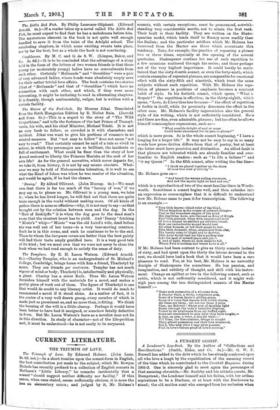CURRENT LITERATURE.
THE TRIUMPH OF LOVE.
The Triumph of Love. By Edmond Holmes. (John Lane. as. 6d. net.)—In a short treatise upon the sonnet-form in English, the best contribution yet made to the subject, which Mr. Bowyer Nichols has recently prefixed to a collection of English sonnets in Methuen's "Little Library," he remarks incidentally that a sonnet "should suggest neither difficulty nor facility." If this canon, when once stated, seems sufficiently obvious, it is none the less an elementary canon; and judged by it, Mr. Holmes's sonnets, with certain exceptions, must be pronounced, notwith- standing very considerable merits, not to attain the first rank. Their fault is their. facility. They are written on the Shake- spearian model, which lends itself to fluency more readily than the Italian; and the particular artifices which Mr. Holmes has borrowed from the Master are those which accentuate this tendency. Take, for example, the practice of repeating a phrase two or three times, especially at the opening of the several quatrains. Shakespeare confines his use of such repetition to a few occasions scattered through his series ; and those perhaps not of the very highest importance. It could hardly be main- tained that the sixty-fourth sonnet, or even the forty-ninth, which contain examples of repeated phrases, are comparable for emotional effect with the sixty-fifth and ninetieth, which treat the same subjects without such repetition. With Mr. Holmes the repe- tition of phrases in positions of emphasis becomes a constant habit of style. In his fortieth sonnet, which opens, "What it despair ? " the repetition is effective; in the thirty-eighth, which opens, "Love, do I love thee less because—" the effect of repetition is feeble in itself, while its proximity discounts the effect in the other case. Mr. Holmes's facility impoverishes also the general style of his writing, which is not sufficiently considered. Here and there are fine, even admirable, phrases ; but too often he allows
himself commonplace expressions, such as— .
" What possible delight of soul or sense Could make atonement for its pain or gloom P "
which is mere prose. So is the whole sonnet beginning, "I have a longing for a larger life." It may not be easy to say in so many words how prose diction differs from that of poetry, but at least the latter must have precision and distinction. An allied fault is that phrases are tolerated which are already familiar and over- familiar to English readers : such as "Is life a failure?" and "0 my Queen!" In the fifth sonnet, after writing the fine line-
" I think we played together on the shore Of some blue inlet of eternity "— Mr. Holmes goes on— "And heard the waters rolling evermore, And saw the mystic light on land and sea,"
which is a reproduction of two of the most familiar lines in Words- worth. Sometimes a sonnet begins well, and then subsides into an expression so commonplace that it is difficult to understand how Mr. Holmes came to pass it for transcription. The following is an example :—
" Fats little knows—blind ruler of the blind, Whose kingdom is the course of outward things— That in the boundless empire of the mind His plaything, Love, sits throned as King of Kings. Fate little guessed, when with empoisoned steel Of love's despair he stabbed my stricken breast, How one immedicable wound would heal All other wounds, or lull their pangs to rest. Fate little dreamed, when, summoned from afar, Thy beauty came to blight and to destroy, That Love would lead me like a guiding star Into the land of inward pence and joy,— A :and of light, where no dark shadows fall, Where Fate is nothing and where Love is all."
If Mr. Holmes had been content to give us thirty sonnets instead of sixty, and had spent upon the thirty the labour devoted to the rest, we should have had a book that it would have been a rare pleasure to read. For, at his best, Mr. Holmes is no unworthy disciple of Shakespeare the sonnetteer. He has passion, and imagination, and subtlety of thought, and skill with his instru- ment. Change an epithet or two in the following sonnet, such as subtle, which is not sufficiently considered, and it might well- nigh pass among the leas distinguished sonnets of the Master himself :— " Some seek possession of a winsome face,
A slender waist, a white, voluptuous arm, Some of a lissom figure's gliding grace, Some of a voice that haunts with subtle charm.
All these are thine ; yet not for these I prize Thee, my Beloved I- whose soul of dazzling light Burns through thy body's beautiful disguise, Veiled by it brightness from my baffled sight.
Some are condemned to gain what they have sought,— A face, an arm, a voice, a slender waist ;— Till Time, the disenchanter, brings to nought Their prized possession and their love misplaced.
But I, who seek what I may ne'er possess, Find in love's failure proof of love's success."










































 Previous page
Previous page